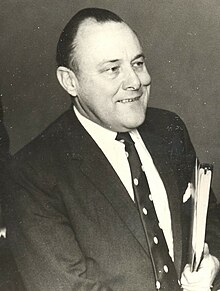Robert Muldoon
Sir Robert David Muldoon (born September 25, 1921 in Auckland , New Zealand , † August 5, 1992 ibid) was a member of the conservative New Zealand National Party and from 1975 to 1984 Prime Minister of New Zealand .
Life
Muldoon grew up in a lower middle class family. He was shaped by his grandmother, an active socialist. His father fell ill with syphilis and was admitted to a psychiatric clinic.
He joined the Army in World War II and fought in the South Pacific and Italy, where he trained as an accountant. He met Duncan MacIntyre and Jack Marshall, members of the National Party, which he joined on his return to New Zealand.
After two unsuccessful attempts to prevail against established party comrades, Muldoon was elected to parliament in 1960. He represented his constituency, Tamaki, in suburbs of Auckland, for 32 years. From 1963 he was subordinate to Treasury Secretary Harry Lake. When he died in 1967 he was his successor, at 45 the youngest finance minister on the island. Actually, he was now entitled to third place in the cabinet. However, Prime Minister Keith Holyoake only put him in eighth place, presumably not liking Muldoon's arrogant and ambitious manner. Nevertheless, he managed to gain sympathy among the population, also because he knew how to use television better than his older colleagues. The National Party's 1969 election victory is largely attributed to him.
Muldoon opposed both abortion and the death penalty . In order to achieve their ban, he temporarily supported the opposition.
After Holyoake's resignation in 1971, he became Deputy Prime Minister behind Jack Marshall . He clearly lost the 1972 election and also resigned. Muldoon became opposition leader until he clearly defeated Bill Rowling in the 1975 election .
Time as prime minister
Muldoon became both prime minister and finance minister. The main goal of his government was to maintain the welfare state in economically difficult times. When Great Britain joined the European Community , the most important foreign market was lost, and there was also the oil crisis of the 1970s.
To solve the economic problems, Muldoon implemented a tax cut. Since this was unsuccessful, wages, prices and dividends were frozen, originally for one year. Loans have been taken out to finance large projects to stimulate the economy. None of the projects that went down in history as Think Big projects brought quick success and so the deadline had to be extended to two years. An estimated one billion New Zealand dollars were lost from the national budget . Muldoon himself later described his financial policy as a mistake.
The National Party remained in power in the 1978 and 1981 elections, but lost many votes to the Labor Party each time.
In 1981 Muldoon supported a trip through New Zealand for the South African rugby team Springboks . He was of the opinion that politics and sport must be separated, even if South Africa was internationally isolated at the time because of apartheid . The event, known as The Tour , sparked protests and demonstrations across the country.
After a dispute with party member Marilyn Waring, who threatened to switch to the opposition, Muldoon set a new election for July 14, 1984. He found himself unable to govern without Waring's support. The Labor Party won 56 of the 93 seats there, and David Lange became the new Prime Minister.
Another dispute broke out between the election and the formal handover to the new government. The New Zealand Bank saw the New Zealand dollar overvalued against the US dollar. She asked Muldoon to carry out a devaluation, but he refused because he did not consider the measure to be socially acceptable. The National Bank had to temporarily suspend trading in the country. It is customary in New Zealand for the old government to choose between voting and handing over power to the new government according to its wishes. Muldoon asked for a long time to carry out the devaluation, but he refused. It was only shortly before the transfer of power that he granted the wish.
After being voted out
Muldoon was also replaced as party chairman shortly after the election. He repeatedly attacked his successor, Jim McLay, until his favorite Jim Bolger , later Prime Minister himself, was given the post in 1986 .
Muldoon's political influence quickly waned. He had to experience how his protégé Bolger drove the liberalization of the New Zealand economy under the catchphrase Ruthanasia . He spoke out unsuccessfully against legalizing homosexuality.
In addition to his work as a member of parliament, he wrote articles in business magazines in which he blamed Ruthanasia for the economic problems. He appeared as a narrator on the Rocky Horror Show and appeared in various commercials and two television series. He also hosted a radio show called Lilies and other things .
On November 17, 1991, he resigned as an MP. A short time later he fell ill and died on August 5, 1992 at the age of 70 in Auckland.
Trivia
Robert Muldoon was known by the nickname "Piggy" because of his plump figure.
Web links
- Biography on primeminister.govt.nz (English)
| personal data | |
|---|---|
| SURNAME | Muldoon, Robert |
| ALTERNATIVE NAMES | Muldoon, Rob; Muldoon, Robert David (full name) |
| BRIEF DESCRIPTION | New Zealand politician, Prime Minister of New Zealand (1975-1984) |
| DATE OF BIRTH | September 25, 1921 |
| PLACE OF BIRTH | Auckland , New Zealand |
| DATE OF DEATH | 5th August 1992 |
| Place of death | Auckland , New Zealand |

